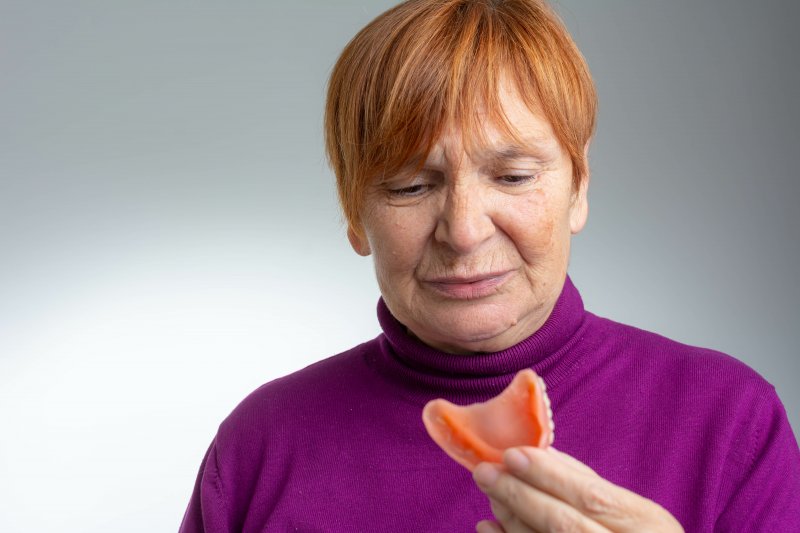
You can generally trust lower dentures to remain stable and secure. Since dental labs customize them, they should fit your mouth snugly and not move around. Still, you may find that you’re struggling to make your lower denture stay in place. There’s no need to panic if that happens; your Lakewood dentist can guide you through the situation. That said, here’s a primer on what causes loose lower dentures and how to better secure them.
What Causes a Loose Lower Denture?
If you find yourself with a loose lower denture, the problem likely stems from one (or more) of the following:
A Flat or Negative Ridge
For a lower denture to stay in place, your jaw needs to have the proper bone height and width. However, it may lack the right dimensions if you’ve suffered tooth loss for quite a while. It’ll have eroded and flattened in that situation, meaning it doesn’t have the bone tissue to support a denture.
Ill-Fitting Denture Teeth
While lower dentures are often well-made, that isn’t always the case. These prosthetics sometimes have borders that are too long or short for a patient. They can then fit rather loosely, failing to form a solid seal with your mouth and easily slipping or moving.
Poor Muscle Control
Lower dentures may sound like no-effort devices, but that idea isn’t true. Wearing one requires control from muscles you may’ve never considered before now. Before you master that control, your lower denture may feel a bit loose or insecure.
How Can You Better Secure It?
If you suffer from a loose lower denture, please don’t panic. Just use the dental tricks listed below:
- Reline Your Denture – If your denture is loose because of a poor fit, have your dentist reline it. Doing so would make its base better adapted to your ridge anatomy.
- Use Adhesives – Three small dots’ worth of adhesive could secure your lower restoration. Just note that adhesives and creams can’t help a poorly shaped denture.
- Keep Practicing– Through persistent practice, you can train your face and tongue to steady lower dentures. This step requires changing your eating and speaking habits.
- Try Implant Dentures – As a last resort, you can always secure your lower dentures with dental implants. These posts fuse with your jaw, ensuring the connected teeth are stable.
The points above should help your lower denture stay in place. As for other tricks and resources, learn more by talking to your dental provider.
About the Author
Dr. Emmanuel is an expert dentist based in Lakewood, CO, having earned her DDS from the Indiana University School of Dentistry. That expertise has led her to work in the dental field for nearly twenty years! Thanks to those years of experience, she’s highly skilled in preventive, cosmetic, and even restorative dentistry. Today, Dr. Emmanuel practices at her self-titled clinic and is reachable on her website and by phone at (303)-986-0090.

